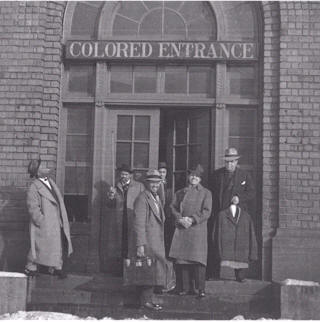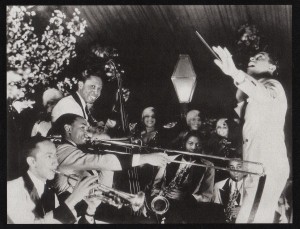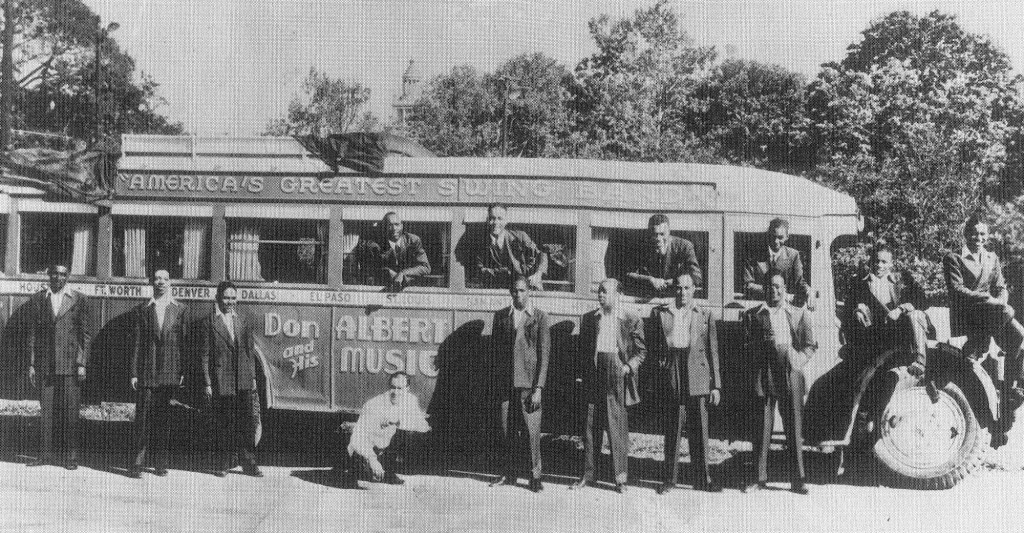All-night trips over bumpy roads and hassles with broken-down buses were just part of the job for musicians touring the country in the Swing Era. Jim Crow laws made it tough for black jazz artists traveling the South to find a meal or a place to sleep for the night. But it wasn’t always grim. Doc Cheatham recalls the days when Cab Calloway’s orchestra drew huge crowds playing tobacco barns in Alabama and Georgia. There was so much cash on hand they crammed fistfuls of dollar bills in the band’s empty instrument cases for safekeeping.
This week on Riverwalk Jazz, legends Clark Terry, Milt Hinton, Doc Cheatham and others tell stories of life on the road. And these jazz greats take to the stage with The Jim Cullum Jazz Band in performances recorded live at The Landing.
Swing was big business in the late 1930s and early 40s. At its peak there were hundreds of bands traveling the highways and back roads of America, playing in small town dance halls and big city ballrooms. Cab Calloway, Count Basie, Benny Goodman, the Dorsey Brothers and Duke Ellington were a handful of the big names in jazz with orchestras on the road almost year-round.
Even the best-paid bands in the Swing Era had to keep up a grueling schedule. They often worked six nights a week and many of them were "one-niters,” which meant traveling hundreds of miles by bus in order to get to the next job after playing until one or two o'clock in the morning.
Tour buses were rarely heated and none had air conditioning. Max Kaminsky called the one he rode while traveling with the Dorsey Brothers Orchestra "a frigid torture chamber." But it had to be better than no bus at all. Some bands toured with all the musicians piled into one car and a trailer pulled behind to carry instruments and baggage.

Lammar Wright, Mario Bauza, Walter Thomas, Eddie Morton, Cab Calloway and Benny Payne, Chattanooga, Tennessee Terminal Station, c. 1940. Photo by Milt Hinton, Milton J. Hinton Photographic Collection.
Milt Hinton played bass with the Cab Calloway Orchestra for fifteen years from 1936 to 19'51. When Milt first joined Cab's band, strict segregation was enforced almost everywhere. Black musicians who made their living on the road developed a network of black families with spare bedrooms, or black rooming houses, where they could stay as they traveled cross-country. Milt tells the story of what happened to him his first night on the road with Cab’s band before he learned the ropes.
In an interview with Dick Cavett, jazz fiddler Joe Venuti tells the story of a practical joke he pulled on Bix Beiderbecke on a train trip through the Southwest. And Clark Terry talks about what it was like to share a room with Count Basie.
Our show this week features recordings from the Riverwalk Jazz archive and audiotape courtesy of National Public Radio.
Photo credit for home page teaser image: Don Albert's tour bus, 1939. Courtesy Frank Driggs.
Text based on Riverwalk Jazz script by Margaret Moos Pick ©2006



